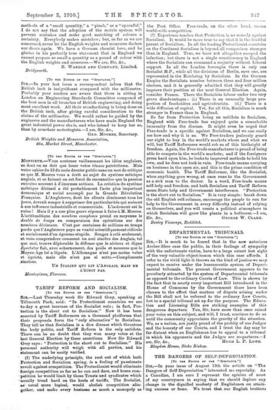TARIFF REFORM AND SOCIALISM.
[TO THE EDITOR OF THE "SPECTATOR.)
Ste,—Last Thursday week Sir Edward Grey, speaking at Tillmouth Park, said: "In Protectionist countries we see to-day a great increase of the Socialist vote ; in fact, Pro- tection is the short cut to Socialism." Now it has been asserted by .Tariff Reformers on a thousand platforms that their proposals form the "only alternative" to Socialism. They tell us that Socialism is a dire disease which threatens the body politic, and Tariff Reform is the only antidote. There can be no doubt that they won many votes at the last General Election by these assertions. Now Sir Edward Grey says; "Protection is the short cut to Socialism." His personal authority will weigh with all parties, and his statement can be easily verified.
(1) The underlying principle, the root out of which both • Protection and Socialism spring, is a feeling of passionate " revolt against competition. The Protectionist would eliminate ' foreign competition as far as he can and dare, and home com- petition he would-limit by those Trusts had syndicates which -usually tread hard on the heels of tariffs. The Socialist, as, • usual mere. logical, would abolish competition • alto- gether, and make every business as much a monopoly as the Post Office. Free-trade, on the other hand, means world-wide competition.
(P.) Experience teaches that Protection is no remedy against Socialism. It would be more true to say that it is the fruitful parent of Socialism. In all the leading Protectionist countries on the Continent Socialism is beyond all comparison stronger than in England. True, we have not altogether escaped the infection; but there is not a single constituency in England where the Socialists can command a majority without Liberal support. In all the London boroughs there is only one Socialist M.P., while all the divisions of Berlin, save one, are represented in the Reichstag by Socialists. In the German Empire the Socialists number between three and four million electors, and it is generally admitted that they will greatly improve their position at the next General Election. Again, consider France. There the Socialists labour under two very grave disadvantages; (i.) There is an unusually large pro- portion of freeholders and agriculturists. (ii.) There is a wide diffusion of capital. Yet, for all this, Socialism is much stronger in France than in England.
So far from Protection being an antidote to Socialism, England with Free-trade has enjoyed quite a remarkable immunity from the disease. It might even be urged that Free-trade is a specific against Socialism, and we can easily see bow and why it is so. We Free-traders jealously guard our right to buy in the world's markets where and what we will, but Tariff Reformers would rob us of this birthright of freedom. Again, the Free-trade manufacturer is proud of being able to compete in the world's markets; and if the foreigners press hard upon him, he looks to improved methods to hold his own, and he does not look in vain. Free-trade means carrying on business in the open air, and this is the prime condition of economic health. The Tariff Reformer, like the Socialist, when anything goes wrong, at once runs to the Government as a sick man to the doctor. In a word, Free-trade means self-help and freedom, and both Socialism and Tariff Reform mean State help and Government interference. "Protection is the short cut to Socialism." It is very simple; break down the old English relf-reliance, encourage the people to run for help to the Government in every difficulty instead of relying on themselves, and you will create a political atmosphere in which Socialism will grow like plants in a hothouse.—I am,










































 Previous page
Previous page